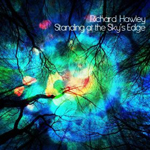|
|
 |
Dusted Reviews
Artist: Richard Hawley Album: Standing at the Sky’s Edge Label: Mute Review date: Sep. 5, 2012 |

|
|
|
 |
A former axe-man for Pulp and assorted other acts, Richard Hawley has now released more than half a dozen studio albums of his own, at a pace of more than one every two years. Despite Hawley’s earlier pedigree as a guitarist, he has marked his solo work as much with the strength of his romantic baritone crooning as with elegant arrangements and guitar lines. Hawley’s work has included warm, inviting, and well-crafted albums as well as a contemporary classic (Coles Corner) and several close-competitors. On his sixth and prior studio LP, Truelove’s Gutter, Hawley stretched his ballads out and created a record that was less about classic pop song structures and more focused on contemplative, mood-setting arrangements. The result didn’t improve upon the best of Hawley’s prior work, but neither was it a step backward.
On his latest full-length, Standing at the Sky’s Edge, Hawley takes a radical turn, giving his songwriting a density and darkness that scarcely surfaced on any of his previous releases. There is one more or less straight-ahead pop song: the typically lovely and memorable “Seek It.” “If you seek it, you won’t find / Another’s eyes so, blinded by love,” Hawley gently sings to us. There is also “Don’t Stare at the Sun,” a wistful atmospheric number that wouldn’t be out of place on prior releases; only the distortion and swirling guitar of the bridge give away the song’s context. However, as a whole, Standing at the Sky’s Edge reverberates with minor chords, crunchy rhythm guitar, screeching leads, and vocals that are alternatively brooding or aggressive.
Hawley’s craftsmanship and taste are too refined to allow him to succumb to incompetence or banal ugliness. But with the aid of a similar album title, his new collection unfortunately calls to mind Oasis’s Standing at the Shoulder of Giants. Both are examples of skilled pop classicists’ making hard-right turns toward murky sounds weighed down by self-seriousness, if not self-righteousness. Take the lumbering title track, for instance. It gently thumps but never lifts off, as if Hawley’s righteous indignation about social injustice has overcome his better instincts when it comes to melody, harmony, and arrangements. Much the same could be said for “She Brings the Sunlight” and “Time Will Bring You Winter.” Plodding along surrounded by swirling distorted guitar lines, such numbers are intricate webs of sound, but whatever their subtleties, they fail to translate into rewarding experiences.
Prior to this latest album, Hawley was swiftly assembling one of the more impressive discographies of any solo artist in 21st century pop music. Standing at the Sky’s Edge is Hawley’s first major misstep. Here’s hoping it knocked the chip off Hawley’s shoulder and he will be ready to return to what he does best the next time around: pop as romance, romance as pop.
By Benjamin Ewing
|







